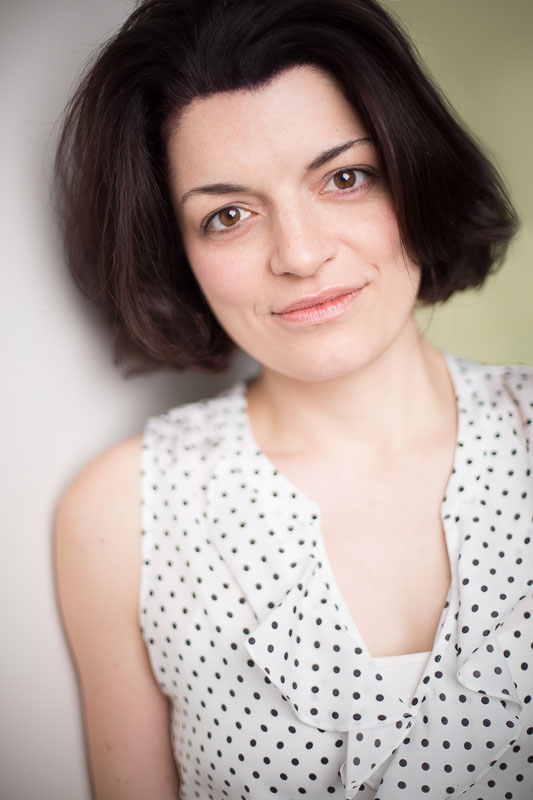In the Spotlight: Jess Grant

I love working with Jess Grant because she’s from another world: the improv comedy world. Her method – standing in front of an audience without notes, performing a sketch onstage, speaking out loud as the words come to her – it’s terrifying. It’s exciting. It’s also instructive, obviously. If Jess can improvise out loud, in front of strangers, what’s the big deal about doing it on a page, in solitude?
When you read this excerpt, you feel dizzy, woozy, alive. The rhythm and the sensory detail harmonize. She’s written a scene for you to feel - physically feel - when you read it. Jess kinesthetically connects to language, and then she transmits her energy to her reader.

Meet Jess
About Jess Grant: I am a comedic performer and improvisor. I've performed in festivals in Vancouver, Chicago, North Carolina and New York City. I have also taught improv at The Impatient Theatre Company and the University of Toronto. I do solo work and will start writing a one-woman show this fall.
Handwriting or computer?
Handwriting. I feel more connected to my imagination when I freewrite. If I start a piece of writing on the computer, I start editing myself before I’ve even finished a sentence.
Page count or time count?
Time count. I hate being told what to do, so when my buzzer goes off after the predetermined amount of time has elapsed, I usually write a little bit longer, to show Father Time he isn’t the boss of me.
First drafts or revision?
First drafts.
Writing solo, writing partner, or writing group?
I’ve only been writing solo so far but have fantasies of working with a partner or a group. I’d love to collaborate on a play with more than one person.
Earplugs/quiet or headphones/music?
Sometimes quiet if I’m having trouble concentrating, but most often I write with music on. My favourite musician to play while I write is Tom Waits. I’m inspired by what a bold, uninhibited artist he is. I like having that on in the room when I’m in creative mode.
How do you make time for your writing practice? How do you handle resistance?
I have a very easy office job so I am never hurting for time. My big issue is resistance! So many times I’ve said to myself, “What’s the point in writing at all? It won’t be any good. Just goof off on the Internet till it’s time to go home.” But the times I would write, I loved it! The next day though, the low-self-esteem bully that lived in my brain would be back at work and I’d be on Wikipedia reading about Gregory Peck. I decided to take small steps to make writing a part of my daily routine. I started writing for 10 minutes once a week. I had no expectations of the writing itself. Even if I just wrote “blah” over and over till my time was up, I’d be achieving. Gradually, I started writing once a day. Now I crave my writing time. The low-self-esteem bully is still working, but his hours have been reduced significantly.
Why do you write?
I didn’t grow up around many other kids. I would play in the woods behind my parents' house and create imaginary worlds with a large cast of characters that experienced happiness and tragedies combined. I’m not sure, but I bet that it’s in those imaginary situations that I learned about myself and tried to make sense of what it meant to be a tiny human on a beautiful and unjust planet. Now that I’m a less tiny human, I’m doing the same thing with creative writing. Really, it’s all about combating or coping with the varying degrees of loneliness and isolation that many of us experience on a day-to-day basis.
Tell us about the excerpt you're sharing today.
I often use Sarah's writing prompts for a 10-minute freewrite. The prompt that inspired this excerpt was: "find a short story you love and read the first paragraph. Copy it in your notebook. Now write your own first paragraph, in that style." I used the opening paragraph of T. C. Boyle's story, “The Night of the Satellite."
I was inspired to explore how a person who is discontent to the point of numbness uses fantasy as a coping mechanism. Here, our narrator is disconnected from her physical self. Her imagination ignites a sexual fantasy to keep her from feeling totally dead inside. Moving in tandem next to her co-worker is enough fuel to keep that fantasy burning. Outside the world of the burger joint, she isn't remotely attracted to the guy. If she wasn't able to use fantasy to split off from her present state, she'd be forced to face her true feelings: depression, and maybe rage. I'm considering making this into a script for a short film.
Excerpt from Washy's Burgers, by Jess Grant
The energy between Ricky and me is electric. In the fry kitchen of Washy’s Burgers, we are separated by four feet of beige vinyl tile. We work in silence, focusing on getting rid of the typical dinner rush. We’d had the same shifts for seven months. I hadn’t spoken to Ricky in school. He wasn’t in my crowd. I was adverse to the kids who wore a lot of black and constantly smelled like stale cigarettes. Ricky’s mandatory Washy’s visor is pulled down close to his paintbrush-thick eyebrows. I see the sheen of grease – or maybe sweat – on the bridge of his nose. The thick polyester uniform sticks to my armpits. My head feels like it’s bobbing in a fish tank. My hands are two autonomous claw cranes. One claw reaches for the hamburger bun while the other removes the green plastic container; tick tick, pull out a chilled brown patty and plop onto bottom half of the bun; left crane lowers down and lands on the mini-fridge door handle, tick, tick, poosh; right crane swoops in, opens yellow container of processed cheese tick ticky tick. The routine is composed of my movements, but really, none of it is mine. Washy’s Burgers fast food system allows no superfluous movement but my body senses a rhythm with Ricky’s. The grind of the blender; the bubbling of the fryer; his hand slamming the microwave door again and again and again. My desire for Ricky is a cheat in the system. Trapped desire will latch onto anything to alight a feeling. I turn on my right heel as the fryer emits a buzz. I pull the fry basket out of the bubbling grease. Dump, clang, tick. Right claw returns the basket into the grease and he’s looking back at me, licking sweat from the tips of his black, thin moustache. Behind my pant zipper, I feel the pulsation of a million tiny green go lights.
Note: These monthly spotlights showcase Mysterious Middle Drafts (MMDs). That means they are somewhere between first drafts and final drafts. This is a challenging stage! Emerging writers bravely share their work-in-progress here for discussion, but this is not a book review or critique: this is a venue for the appreciation of Mysterious Middle Drafts. Thank you for making this writing space safe and supportive.
Discussion:
-
What remains with you after reading Jess's work?
-
Can you articulate what’s working in this excerpt – and more importantly, why it’s working?
-
How is your own writing practice like Jess's? How is it different?
Please leave a comment below. And thank you, Jess!
Photo credit (top): Patrick Schneider on Unsplash.

2 comments
Leave a comment